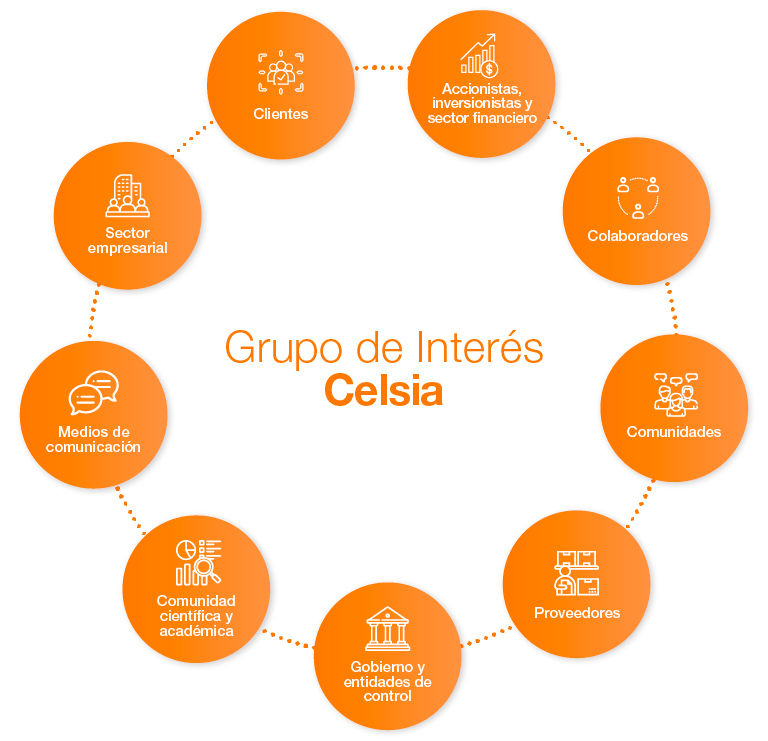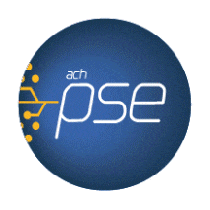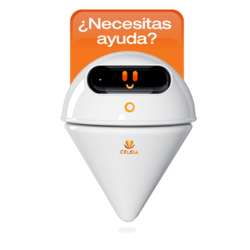This is a fundamental input for our roadmap, which reflects the most important work focuses on environmental, social and governance (ESG) matters. They allow us to adapt to changes in the environment and the expectations of our stakeholders. Our materiality analysis carried out in 2022 is still in force, and this is how we carried out the process of identifying and prioritizing the key issues for the permanence of our business over time.
Key aspects of the analysis
- Double materiality: we identify the impacts we generate on the environment and society, as well as the financial impact of these issues on the company.
- Strategic focus on risk management: in developing this exercise, we applied our Corporate Risk Management Methodology, aligned with international best practices such as the COSO ERMstandard. This framework outlines components that support a clear understanding of the business, its objectives, the context, and market trends, enabling effective alignment between material topics and the company’s strategic risks.
- A joint effort with our stakeholders: our analysis incorporated the expectations of stakeholders and the influence these issues have on their strategic decision
Process:
Identifying and Prioritizing Material Topics and Key Issues
Through this process, which consists of four steps, we define our material topics:
Context analysis: We benchmark mega-trends and global, sectoral and national contexts of sustainability to understand the operational scenario in which Celsia finds itself, identify main trends, risks, impacts and opportunities, and build a preliminary list of potentially material topics. We delved into the topics on which the standards, norms and frameworks are focusing, understood the landscapes of ESG risks of the countries in which we operate and, finally, analyzed the material topics of peer companies, to gain a 360 view of the panorama in the short, medium and long-term.
 Sesions with internal leaders: We conducted interviews with internal leaders of the organization to identify the latent ESG impacts, risks and opportunities in Celsia, from their point of view. We asked them about their expectations regarding sustainability by 2030 and presented the list of potential material topics that we obtained as a result of the context analysis phase to carry out a first prioritization of topics and subtopics with them.
Sesions with internal leaders: We conducted interviews with internal leaders of the organization to identify the latent ESG impacts, risks and opportunities in Celsia, from their point of view. We asked them about their expectations regarding sustainability by 2030 and presented the list of potential material topics that we obtained as a result of the context analysis phase to carry out a first prioritization of topics and subtopics with them.
 Involvement with stakeholder: We met and listened to different stakeholder to learn and understand the ESG issues in which they saw an impact by Celsia, both positive and negative, and what opportunities and risks they identified for the permanence of the business in the long-term, from their knowledge and relationship.
Involvement with stakeholder: We met and listened to different stakeholder to learn and understand the ESG issues in which they saw an impact by Celsia, both positive and negative, and what opportunities and risks they identified for the permanence of the business in the long-term, from their knowledge and relationship.
 Prioritization and validation: We systematized and weighted the results with the inputs collected during the first three phases and built the materiality matrix taking into account the company’s impacts on the economy, the environment and people, the risks and opportunities for Celsia, and the influence of each topic on stakeholders.
Prioritization and validation: We systematized and weighted the results with the inputs collected during the first three phases and built the materiality matrix taking into account the company’s impacts on the economy, the environment and people, the risks and opportunities for Celsia, and the influence of each topic on stakeholders.
This comprehensive process allows us to keep sustainability at the core of our corporate strategy and to address the most relevant issues with clarity and long-term focus for all stakeholders.
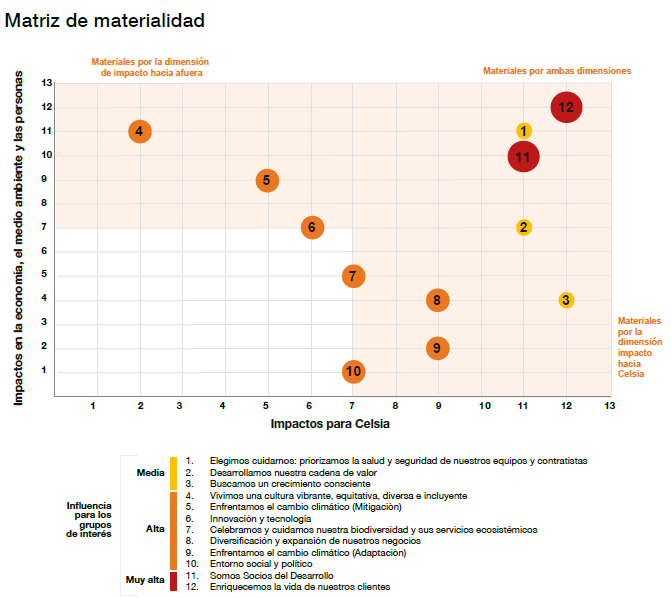
Our material topics:
A Greener Planet
- We Face Climate Change: Based on mitigation, we promote the use and consumption of clean energy, contributing to the decarbonization of energy and the economy. Based on adaptation, we prepare and respond to climatic variations that may affect services, due to events related to climate, the availability of water resources or natural disasters.
- We celebrate and take care of our biodiversity and its ecosystemic services: We focus on preserving, securing information and caring for the fauna and flora in the biological corridors in which we are present. We know that no-net loss of biodiversity is the basis of any action, which is why we put ourselves before the risks of it from the early stages of the projects and throughout their life cycle. We have declared that we will make the effort to be a company with a net positive impact on biodiversity by 2030.
We are Partners of Development

- We live in a vibrant, equitable, diverse and inclusive culture: We seek to promote and guarantee the diversity of and equal opportunities for our teams, developing capabilities in a changing context, respecting human rights at all times and providing the best experience to employees. We are also partners of development through good engagement with our communities, avoiding negative, real or potential impacts on Human Rights that may be caused in any of the stages of our value chain. In addition, being partners of development also means creating social value through investments, generating local employment and developing works for taxes.
- We choose to take care of ourselves prioritizing the health and safety of our teams and contractors: Security is a vital and non-negotiable value. Our main objective is for our employees and contractors to return home healthy every day and for our products and services to maintain the highest quality standards to take care of the communities in which we are present.
3. We Act with a Vision of the Future

- Diversification and expansion of our businesses: We are an actor in the country’s energy revolution. This is why we offer a diversified generation matrix, with innovative and efficient services to guarantee the necessary resources for our operation.
- Innovation and technology: Through technology and digitization, we diversify our services, improve our performance, simplify procedures and processes, and quickly respond in terms of service and operations. Since we know technology carries greater risks related to information, cybersecurity is a vital component of our management.
We develop our value chain
Supplier management is one of Celsia’s pillars. We seek sustainable growth in the long-term that guarantees the sustainability of our supply chain, with the timely management of any risks that may arise, through the continuous improvement of administrative, ethical and behavioral, commercial, technical, environmental, productive and financial skills, which ensure the promotion and respect of human rights.
We Enrich Customers' Lives
We want to turn our customers into fans of Celsia. Therefore, our vision is focused on delivering a quick, easy, effective and memorable experience during their relationship with our company, through an offer of innovative solutions and quality, uninterrupted services, all integrated into the national electrical system and with full availability.
We adapt to our social and political environment
This integrates the physical security of the operation and the proactive analysis of the political environment with respect to changes or updates in the regulatory or legal sphere of the country’s electricity sector.
We seek conscious growth
We generate value for all our stakeholders by developing profitable and eco-efficient activities that respond to the needs of the market and our customers.
Materiality Analysis: A Joint Exercise with our Stakeholders
Knowing that the materiality analysis is a dynamic, participatory exercise that supports the strategy’s execution, we include our stakeholders in the exercise. As a result, we identify the topics that are important to them, either because they see them as an opportunity or as a risk for Celsia, or because they see them as a positive or negative impact that we generate.
The stakeholders we involved were prioritized based on the AA1000(SES) Accountability, standard, characterizing them according to the methodology by dependency, responsibility, tension, influence and perspective of each actor.
The stakeholders that participated in the process were communities, State, collaborators, shareholders, suppliers, contractors, customers and our corporate group, with representatives from Odinsa, Cementos Argos and Grupo Argos.
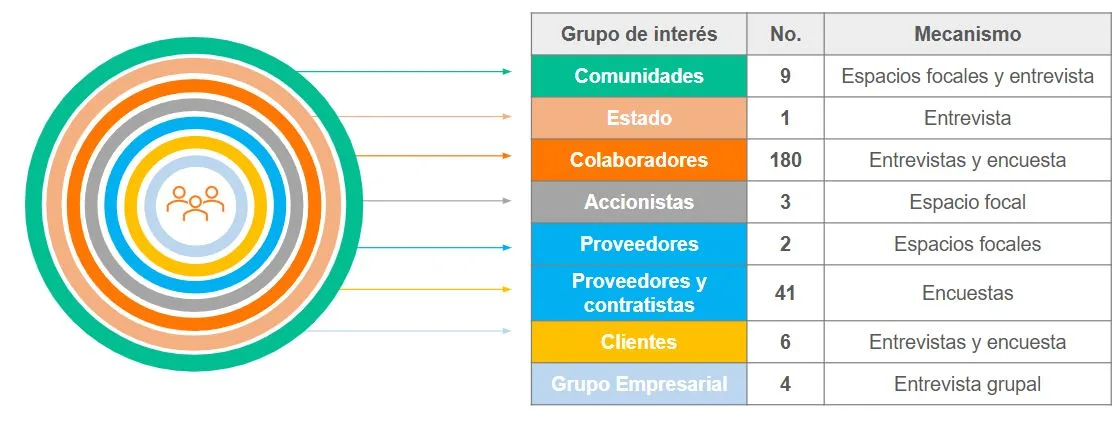
The top 5 issues prioritized by our stakeholders according to influence, impact and risks were:
| Influence | Impact | Risks |
|---|---|---|
| People's health and safety | People's health and safety | People's health and safety |
| Our people | Our people | Social and political environment |
| Responding to climate change | Protection of biodiversity and ecosystem services | Service access, availability and reliability |
| Customer experience | Service access, availability and reliability | Responding to climate change |
| Energy efficiency | Innovation and technology | Innovation and technology |
The key issues highlighted by all stakeholders are: Biodiversity, partners of development and climate change..
We Connect, Collaborate and Create Impact
We develop our relationship with our stakeholders within an ethical, respectful and balanced framework made up of our values, practices and corporate commitments, which help us build and maintain trust, contributing to sustainable development.
At Celsia, we maintain continuous engagement with our stakeholders. We have a particular strategy for each stakeholder, in order to respond to requests, recommendations and suggestions with clear, transparent and fluid responses, in accordance with their expectations. Day-to-day interactions with those directly responsible are part of this management, and our sustainability team periodically promotes additional dialogue and consultation spaces, in addition to the different channels available to receive and process their concerns.

We have a manual to identify and treat engagement risks with our stakeholders, such as social, political, regulatory and reputational risk. It seeks to strengthen the relationship by identifying their particularities (characteristics, needs, interests, expectations and preferences). We periodically review them under the criteria of dependency, responsibility, tension, influence and perspective, based on the AA1000(SES) standard.
With the purpose of maintaining a relationship based on best practices, we performed an exercise in 2022 to characterize, prioritize and standardize our stakeholders, which is still in force.
With the purpose of maintaining a relationship based on best practices, we performed an exercise in 2022 to characterize, prioritize and standardize our stakeholders, which is still in force.
Who we impact:
